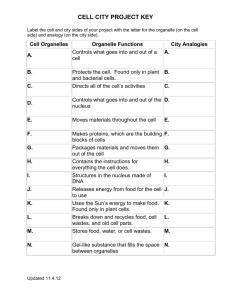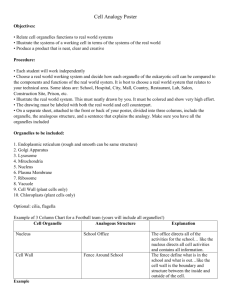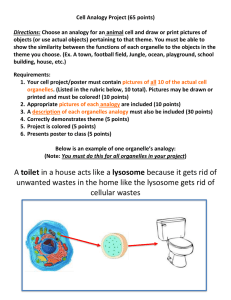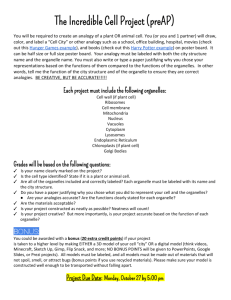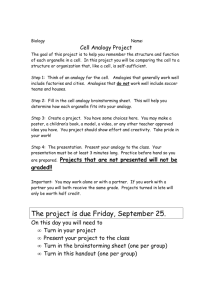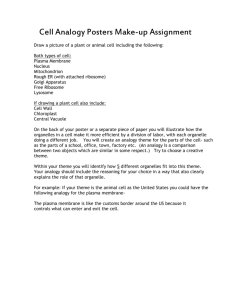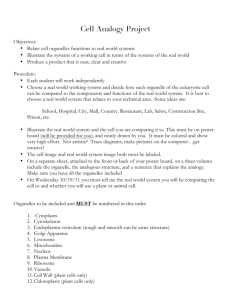Cell Analogy Project
advertisement
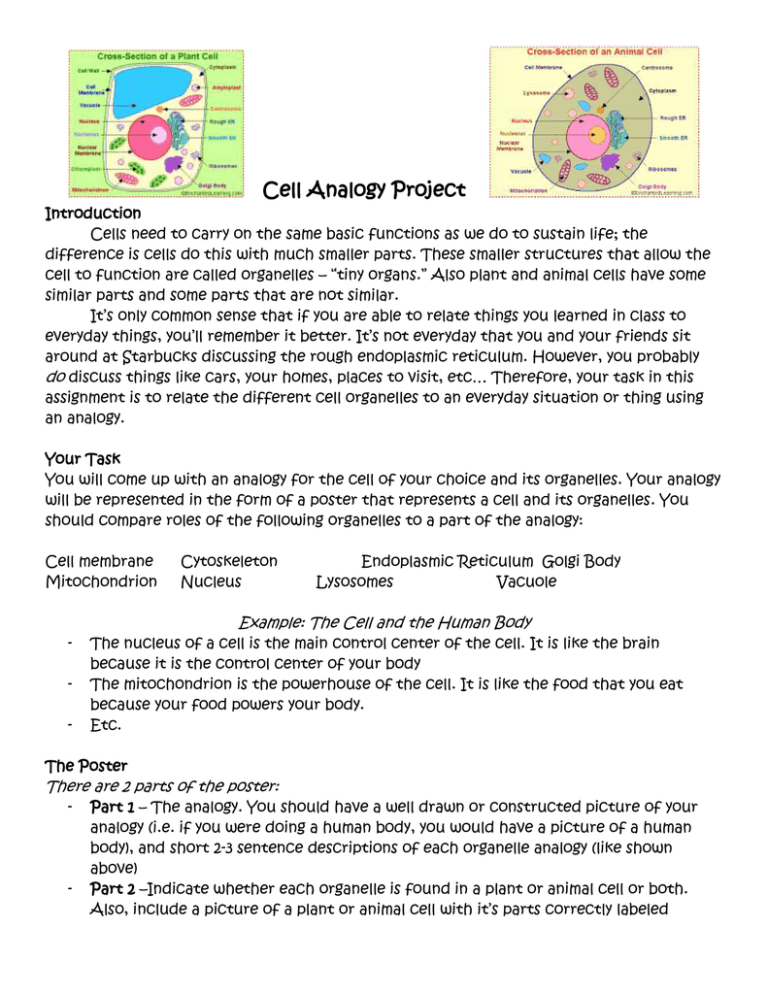
Cell Analogy Project Introduction Cells need to carry on the same basic functions as we do to sustain life; the difference is cells do this with much smaller parts. These smaller structures that allow the cell to function are called organelles – “tiny organs.” Also plant and animal cells have some similar parts and some parts that are not similar. It’s only common sense that if you are able to relate things you learned in class to everyday things, you’ll remember it better. It’s not everyday that you and your friends sit around at Starbucks discussing the rough endoplasmic reticulum. However, you probably do discuss things like cars, your homes, places to visit, etc… Therefore, your task in this assignment is to relate the different cell organelles to an everyday situation or thing using an analogy. Your Task You will come up with an analogy for the cell of your choice and its organelles. Your analogy will be represented in the form of a poster that represents a cell and its organelles. You should compare roles of the following organelles to a part of the analogy: Cell membrane Mitochondrion - Cytoskeleton Nucleus Endoplasmic Reticulum Golgi Body Lysosomes Vacuole Example: The Cell and the Human Body The nucleus of a cell is the main control center of the cell. It is like the brain because it is the control center of your body The mitochondrion is the powerhouse of the cell. It is like the food that you eat because your food powers your body. Etc. The Poster There are 2 parts of the poster: - - Part 1 – The analogy. You should have a well drawn or constructed picture of your analogy (i.e. if you were doing a human body, you would have a picture of a human body), and short 2-3 sentence descriptions of each organelle analogy (like shown above) Part 2 –Indicate whether each organelle is found in a plant or animal cell or both. Also, include a picture of a plant or animal cell with it’s parts correctly labeled Grading Rubric – Cell Organelle Analogy Project Category Accuracy and Clarity of Analogy (8 pts) Accuracy of Organelle Description (8 pts) Indicated whether each organelle is found in plant or animal cell or both (8 pts) Inclusion of picture of colored and labeled plant or animal cell. (5 pts) Creativity (5 pts) Completion and Organization (5 pts) Excellent Analogy makes sense. All organelles are included. Descriptions are clear, lengthy and complete. 8 Includes all required organelles. All functions are correct. 8 Correctly indicated whether each organelle is found in plant or animal cell or both 8 Good Average Below Average Analogy makes sense. 2 organelles are included. Descriptions are unclear and/or incomplete. 2 Poor Analogy makes sense. 6 organelles are included. Descriptions are clear, and complete. 6 Analogy makes sense. 4 organelles are included. Descriptions are clear and short. 4 Missing 2 requirements from Excellent. 6 Missing 4 requirements from Excellent. 4 Missing 6 requirements from Excellent. 2 Missing more than 7 requirements from Excellent. 1 1-2 organelles indication incorrect or missing 3-4 organelles indication incorrect or missing 5-6 organelles indication incorrect or missing 7-8 organelles indication incorrect or missing 6 4 2 1 Included colored, and labeled 5 Included, colored, and labeled 5 Included colored and/or labeled 3 Included, not colored or labeled 1 Your Analogy is creative. Your analogy is NOT a human body. 5 Your Analogy is creative, but used by another group. It is not a human body. 4 Project is organized. It shows an extremely high amount of effort. 5 Project is organized. It shows a high amount of effort. 4 Your Analogy is SOMEWHAT creative. It is not a human body. 3 Project is somewhat organized. It shows some amount of effort. 3 Analogy makes sense. 1 organelle is included. 1 Not included 0 Your analogy is not creative. 2 Your analogy is a human body. 1 Project is barely organized. It shows a minimal amount of effort. 2 Project is not organized. It shows no amount of effort. 1 Total Score: ______/40 points
